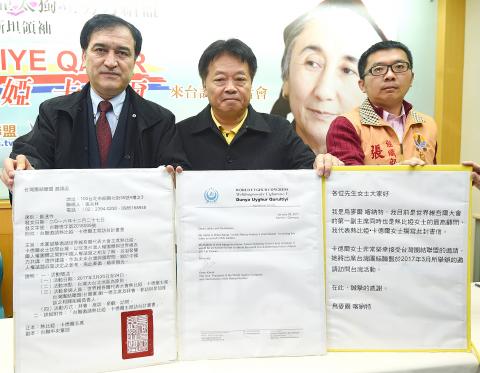World Uyghur Congress president Rebiya Kadeer has accepted an invitation from the Taiwan Solidarity Union (TSU) to visit Taiwan at the end of March, which would be the activist’s first visit to the nation.
The visit, if approved, would see Kadeer hold talks with Taiwanese activists and politicians about human rights, self-determination and independence.
In a video played at a news conference in Taipei yesterday, Kadeer expressed a deep interest in visiting Taiwan, and connecting with local activists and politicians, urging the government to give the green light to her visit.

Photo: Liao Chen-huei, Taipei Times
“Taiwan is in unity with East Turkestan, Tibet and Southern Mongolia. We have to help each other, and exchange opinions and experiences at all times,” Kadeer said. “We support all the movements you launch in the name of freedom and we also need your support.”
She congratulated President Tsai Ing-wen (蔡英文) on her election victory last year and expressed support for Tsai’s administration.
Japan Uyghur Association president Ilham Mahmut said Kadeer had long been planning to visit Taiwan, but the administration of former president Ma Ying-jeou (馬英九) denied her entry in 2009, even though Kaohsiung Mayor Chen Chu (陳菊) had helped file a visa application for Kadeer’s participation at a film festival.
Having criticized the former administration’s treatment of the human rights activist, the Democratic Progressive Party (DPP), now in power, should be open to Kadeer’s visit, Mahmut said.
Though enshrined in China’s constitution, religious freedom is not allowed in reality, with conflicts between Uighurs and Chinese authorities often resulting from forceful intervention in religious practices, such as growing a beard and wearing a hijab, he said.
Press freedom is also prohibited and China’s state-run news outlets only publish stories that demonize Uighurs as terrorists, he added.
While China sources one-third of its energy from East Turkestan, about 90 percent of Uighurs are farmers and are living in poverty, he said.
“Should Uighurs not resist [China] under those circumstances?” he asked. “We are not different from Taiwanese. We are not different from people in other countries. We yearn for freedom and hope to run our own country on our ancestral lands.”
Kadeer’s visit would forge a bond between people subject to China’s suppression such as Uighurs, Taiwanese, Tibetans, Mongolians and Hong Kongers, TSU Chairman Liu I-te (劉一德) said.
Local pro-independence groups are generally indifferent to independence movements in other nations, but collaborating with foreign independence groups is necessary to counter China, Liu said.
“The TSU will stand together with the so-called separatist groups and help them resist Chinese imperialism,” Liu said.
The government should forsake the Constitution’s territorial claim on China — including Xinjiang, Inner Mongolia, Tibet and the South China Sea — and draw a clear line between Taiwan and China, he added.
Presidential Office spokesman Alex Huang (黃重諺) yesterday said any individual’s visa application would be handled by the concerned government agencies in accordance with the relevant regulations.
Additional reporting by CNA

Chinese Nationalist Party (KMT) Chairman Eric Chu (朱立倫), spokeswoman Yang Chih-yu (楊智伃) and Legislator Hsieh Lung-chieh (謝龍介) would be summoned by police for questioning for leading an illegal assembly on Thursday evening last week, Minister of the Interior Liu Shyh-fang (劉世芳) said today. The three KMT officials led an assembly outside the Taipei City Prosecutors’ Office, a restricted area where public assembly is not allowed, protesting the questioning of several KMT staff and searches of KMT headquarters and offices in a recall petition forgery case. Chu, Yang and Hsieh are all suspected of contravening the Assembly and Parade Act (集會遊行法) by holding

PRAISE: Japanese visitor Takashi Kubota said the Taiwanese temple architecture images showcased in the AI Art Gallery were the most impressive displays he saw Taiwan does not have an official pavilion at the World Expo in Osaka, Japan, because of its diplomatic predicament, but the government-backed Tech World pavilion is drawing interest with its unique recreations of works by Taiwanese artists. The pavilion features an artificial intelligence (AI)-based art gallery showcasing works of famous Taiwanese artists from the Japanese colonial period using innovative technologies. Among its main simulated displays are Eastern gouache paintings by Chen Chin (陳進), Lin Yu-shan (林玉山) and Kuo Hsueh-hu (郭雪湖), who were the three young Taiwanese painters selected for the East Asian Painting exhibition in 1927. Gouache is a water-based

Taiwan would welcome the return of Honduras as a diplomatic ally if its next president decides to make such a move, Minister of Foreign Affairs Lin Chia-lung (林佳龍) said yesterday. “Of course, we would welcome Honduras if they want to restore diplomatic ties with Taiwan after their elections,” Lin said at a meeting of the legislature’s Foreign Affairs and National Defense Committee, when asked to comment on statements made by two of the three Honduran presidential candidates during the presidential campaign in the Central American country. Taiwan is paying close attention to the region as a whole in the wake of a

OFF-TARGET: More than 30,000 participants were expected to take part in the Games next month, but only 6,550 foreign and 19,400 Taiwanese athletes have registered Taipei city councilors yesterday blasted the organizers of next month’s World Masters Games over sudden timetable and venue changes, which they said have caused thousands of participants to back out of the international sporting event, among other organizational issues. They also cited visa delays and political interference by China as reasons many foreign athletes are requesting refunds for the event, to be held from May 17 to 30. Jointly organized by the Taipei and New Taipei City governments, the games have been rocked by numerous controversies since preparations began in 2020. Taipei City Councilor Lin Yen-feng (林延鳳) said yesterday that new measures by